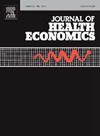Polluted air, healthier diets: Household food consumption patterns in response to air quality in China
IF 3.6
2区 经济学
Q1 ECONOMICS
引用次数: 0
Abstract
This study examines how air pollution affects household food consumption using high-frequency data from over 30,000 households in 25 Chinese cities (2014–2019). Employing an instrumental variable approach based on wind direction, we find that a one-standard-deviation increase in PM2.5 raises weekly expenditure on healthy foods, such as fruits, vegetables, and dairy, by 9.3 yuan, or 11 % of the within-household standard deviation. Spending on less healthy foods remains unaffected, suggesting targeted adjustments toward nutrient-dense foods. These changes improve nutrient intake but are immediate and transitory, with no evidence of lasting dietary shifts. The effects are stronger for higher-income households and those with elderly members, reflecting health concerns and financial flexibility, while lower-income households show constrained responses. Air pollution also reduces dining out expenditures, indicating a substitution toward home-prepared meals. These findings highlight air pollution’s welfare costs, socioeconomic disparities, and the need for equitable public health policies.
空气污染,饮食健康:中国家庭食物消费模式对空气质量的响应
本研究利用2014-2019年中国25个城市3万多户家庭的高频数据,研究了空气污染如何影响家庭食品消费。采用基于风向的工具变量方法,我们发现PM2.5每增加一个标准差,每周在健康食品(如水果、蔬菜和乳制品)上的支出就会增加9.3元,占家庭内标准差的11%。在不太健康的食品上的支出不受影响,这表明有针对性地调整营养密集的食品。这些变化改善了营养摄入,但都是直接和短暂的,没有证据表明饮食会发生持久的变化。对高收入家庭和有老年人的家庭的影响更大,反映出健康问题和财务灵活性,而低收入家庭的反应则受到限制。空气污染也减少了外出就餐的支出,表明人们开始转向在家做饭。这些发现强调了空气污染的福利成本、社会经济差异以及制定公平的公共卫生政策的必要性。
本文章由计算机程序翻译,如有差异,请以英文原文为准。
求助全文
约1分钟内获得全文
求助全文
来源期刊

Journal of Health Economics
医学-卫生保健
CiteScore
6.10
自引率
2.90%
发文量
96
审稿时长
49 days
期刊介绍:
This journal seeks articles related to the economics of health and medical care. Its scope will include the following topics:
Production and supply of health services;
Demand and utilization of health services;
Financing of health services;
Determinants of health, including investments in health and risky health behaviors;
Economic consequences of ill-health;
Behavioral models of demanders, suppliers and other health care agencies;
Evaluation of policy interventions that yield economic insights;
Efficiency and distributional aspects of health policy;
and such other topics as the Editors may deem appropriate.
 求助内容:
求助内容: 应助结果提醒方式:
应助结果提醒方式:


